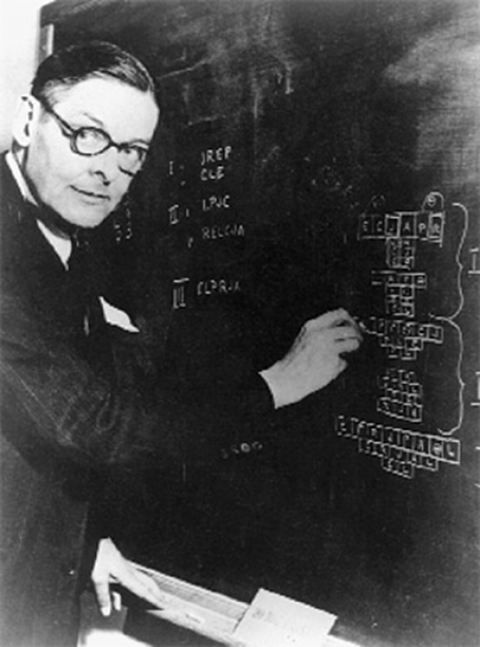T. S. Eliot at the Institute for Advanced Study

In November 1946, Frank Aydelotte (Director, 1939–47) invited the poet T. S. Eliot to come to the Institute for Advanced Study as a Member in the School of Historical Studies and the first unofficial artist in residence at the Institute. By the time Eliot’s appointment, along with the appointments of the British historian Arnold J. Toynbee and the Danish physicist Niels Bohr, was announced in the New York Times on January 13, 1948, J. Robert Oppenheimer had succeeded Aydelotte as Director (1947–66). Eliot arrived at the Institute in October 1948, observing in a letter to his secretary in London, “My ship was a day late on account of head winds, but the voyage was otherwise comfortable, and I am very sumptuously installed here in Princeton.”
The photograph below, which shows Eliot with blackboard diagrams of his play The Cocktail Party, was taken at the Institute on November 10, 1948. Six days prior, the Nobel Foundation had awarded Eliot the Nobel Prize in Literature “for his remarkable pioneering work in modern poetry.” Eliot left the Institute at the end of November in order to deliver his Nobel lecture on December 10 in Sweden. When The Cocktail Party premiered in August 1949 at the Edinburgh Festival, it was described as “one of the finest dramatic achievements of our times” by the London Daily Telegraph.

In Princeton, Eliot lived on Alexander Street in a small white-frame colonial house with a garden. During his time at the Institute, he worked on The Cocktail Party, his modern take on Euripides’s Alcestis, involving a troubled married couple, two cocktail parties, and the intervention of a mysterious stranger. Charles Poore in The New York Times described it “as not exactly a warm-hearted play, but it is lit with a frosty brilliance. It might have been called ‘Things Are Tough Everywhere,’ since its characters— the saint and the sinners—are not promised much pleasure this side of Paradise.”
In an October 15, 1948, letter to poet Sir Herbert Read, Eliot refers to “the play I am working on for Martin Brown. He wants a play ready next summer for production if possible in Edinburgh in September.” He continues to inform Read, “This Institute is a place which I think you would like, and I shall tell you all about it when I return. Incidentally, Princeton is a much more pleasant place to live in than most of the big university centers. It is purely a university town and one has the sense of being very near the country.”
When news came a month into his stay that he had won the Nobel Prize in Literature, Eliot wrote to poet and editor John Hall Wheelock: “The award has given me mixed feelings, because it would have been more convenient in another year, as it is I am under obligation to go to Stockholm at rather short notice, and, therefore, I am obliged to curtail my visit.”
Six months after premiering in Edinburgh in the summer of 1949, The Cocktail Party opened on Broadway, winning an Antoinette Perry “Tony” award in April 1950. When it opened in London in May, one critic observed, “Sir Bronson Albery, manager of the New Theatre, tells me that he cannot remember a heavier advance booking there ... Everybody wants to see it because everybody wants to be in a position to say that he or she admires it, despises it, adored it, loathes it, understands it or can’t make out what the blazes it is all about.” By November, the play had been translated into French, German, Italian, and Swedish.
When asked by a Time magazine reporter why he had written the play in verse rather than prose, Eliot replied: “I can write verse better than prose. When it is colloquially spoken, the very rhythm gets under people’s skins and has a kind of atmospheric effect ... The effect of first-rate verse should be to make us believe that there are moments in life when poetry is the natural form of expression of ordinary men and women.”
Before departing Princeton in November 1948, Eliot donated a copy of Notes towards the Definition of Culture (Faber and Faber, 1948) to the Institute library. In this critical treatise, which Eliot originally authored as a series of articles in New English Weekly, Eliot observes: “So of society we can only say: ‘We shall try to improve it in this respect or the other, where excess or defect is evident; we must try at the same time to embrace so much in our view, that we may avoid in putting one thing right, putting something else wrong.’ Even this is to express an aspiration greater than we can achieve: for it is as much, or more, because of what we do piecemeal without understanding or foreseeing the consequences, that the culture of one age differs from that of its predecessor."


